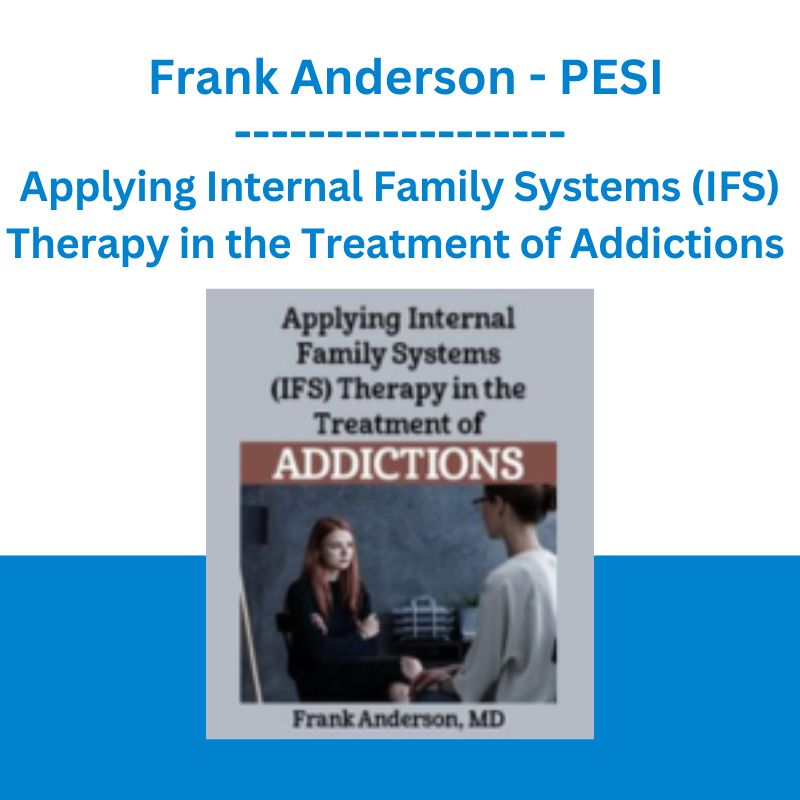*** Proof of Product ***
Exploring the Essential Features of “Applying Internal Family Systems (IFS) Therapy in the Treatment of Addictions – Frank Anderson”
Therapists frequently encounter clients grappling with various forms of addiction, whether rooted in substances, food, gambling, or sex. However, the treatment process itself can sometimes trigger deep-seated traumatic experiences, particularly connected to feelings of guilt and shame. Integrating an awareness of trauma into the therapeutic approach of addictions, Internal Family Systems (IFS) therapy emerges as a non-pathologizing treatment modality. It facilities a profound exploration wherein clients can “befriend” their addictive parts, fostering understanding of their positive protective intentions. This discussion will delve into the intersection of addiction and trauma, elucidating how to navigate associated beliefs, behaviors, and biological conditions prevalent in addictive behaviors. Moreover, it will illuminate strategies to guide clients towards healing the underlying traumatic wounds beneath their addictions.
This product is not endorsed by, sponsored by, or affiliated with the IFS Institute and does not qualify for IFS Institute credits or certification.
Speaker
Frank Anderson, MD
Frank Anderson, MD, completed his residency and was a clinical instructor in psychiatry at Harvard Medical School. He is both a psychiatrist and psychotherapist. He specializes in the treatment of trauma and dissociation and is passionate about teaching brain-based psychotherapy and integrating current neuroscience knowledge with the IFS model of therapy.
Dr. Anderson is a lead trainer at the IFS Institute with Richard Schwartz and maintains a long affiliation with, and trains for, Bessel van der Kolk’s Trauma Center. He serves as an advisor to the International Association of Trauma Professionals (IATP) and was the former chair and director of the Foundation for Self-Leadership.
Dr. Anderson has lectured extensively on the Neurobiology of PTSD and Dissociation and wrote the chapter “Who’s Taking What” Connecting Neuroscience, Psychopharmacology and Internal Family Systems for Trauma in Internal Family Systems Therapy – New Dimensions. He co-authored a chapter on What IFS Brings to Trauma Treatment in Innovations and Elaborations in Internal Family Systems Therapy, and recently co-authored Internal Family Systems Skills Training Manual.
Speaker Disclosures:
Financial: Dr. Frank Anderson maintains a private practice. He is the Executive Director of the Foundation for Self Leadership and has employment relationships with The Trauma Center and The Center for Self Leadership. Dr. Anderson receives royalties as a published author. He receives a speaking honorarium, recording, and book royalties from PESI, Inc. He has no relevant financial relationships with ineligible organizations.
Non-financial: Dr. Frank Anderson is a member of the New England Society Studying Trauma and Dissociation and the International Society for the Study of Trauma and Dissociation.
Objectives
- Participants will gain an overall understanding of the IFS model and how it applies to clients.
- Learn the roles of emotions, pain & trauma within a person to begin to understand common client reactions such as substance abuse, suicidal thoughts, obsessing, conflict avoidance, binging, cutting and more.
- Learn how to assess a client’s diagnosis and symptoms through IFS.
- Understanding the process of befriending addictive parts.
- Learn how to deal with the conflicts (Polarizations) in relation to addictions.
- Gain an understanding of Healing the Wound and the steps towards healing.
Outline
Understanding the Complex Interplay of Addiction and Trauma
- Introduction to Addiction as a Coping Mechanism for Trauma
- Exploring the Relationship between Trauma, Shame, and Guilt in Addiction
- Recognizing How Trauma Manifests in Addictive Behaviors
Internal Family Systems (IFS): A Trauma-Informed Approach to Addiction Treatment
- Overview of IFS as a Non-Pathologizing Modality
- Integrating Trauma-Informed Principles into IFS
- Navigating Trauma Triggers and Emotional Flashbacks within the IFS Framework
Befriending Addictive Parts: Healing Through Compassionate Exploration
- Identifying and Understanding Protective Roles of Addictive Parts
- Cultivating Self-Compassion and Curiosity Towards Addictive Parts
- Healing Trauma Through the Unburdening Process in IFS
Addressing Beliefs, Behaviors, and Biological Conditions in Addiction Recovery
- Challenging Negative Beliefs and Core Wounds Underlying Addiction
- Implementing Coping Strategies for Managing Triggers and Urges
- Utilizing Mindfulness and Somatic Techniques to Regulate the Nervous System
Facilitating Lasting Healing and Integration
- Fostering Connection with Self and Other Parts Beyond Addiction
- Supporting Relapse Prevention Through Continued Trauma-Informed Care
- Celebrating Milestones and Cultivating Resilience in Recovery
Target Audience
- Addiction Professionals
- Licensed Clinical/Mental Health Counselors
- Marriage & Family Therapists
- Psychologists
- Social Workers
Please see the full list of alternative group-buy courses available here: https://lunacourse.com/shop/










 Forexmentor - Recurring Forex Patterns
Forexmentor - Recurring Forex Patterns  Team NFT Money - Ultimate NFT Playbook
Team NFT Money - Ultimate NFT Playbook  Erik Banks - Alternative Risk Transfer
Erik Banks - Alternative Risk Transfer  Fred Haug - Virtual Wholesaling Simplified
Fred Haug - Virtual Wholesaling Simplified  Matthew Kratter - Trader University
Matthew Kratter - Trader University  Jesse Livermore Trading System - Joe Marwood
Jesse Livermore Trading System - Joe Marwood  Ed Ponsi - Forex Trading
Ed Ponsi - Forex Trading